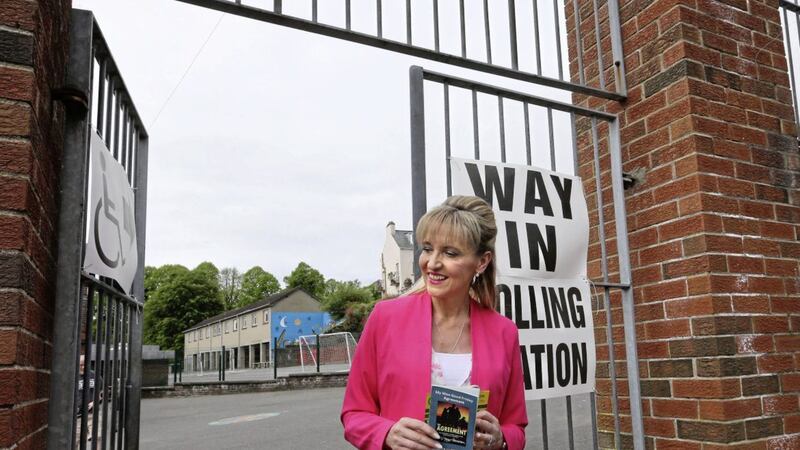In the late 1990s, the electoral battle within nationalism was hotting up.
The ceasefire of 1994 had come at a time when the SDLP’s dominance within nationalism had been confirmed following Joe Hendron’s capture of the West Belfast parliamentary seat from Gerry Adams two years previously. Thereafter, the peace process allowed Sinn Féin to attract support from tens of thousands of natural party voters for whom the violence of the IRA had been the solitary factor preventing them from putting an X or first preference next to party candidates in the polling booth.
Over the years that followed, as the Sinn Féin vote rose and ultimately eclipsed that of the SDLP, elected representatives of the latter party remained in denial, convincing themselves that votes lost to the republican party were merely being ‘loaned’ and would return at some point soon. I can recall the ever prescient Ian Knox mocking the sentiment in a cartoon in this very paper at the time, a belief in which only served the purpose of allowing SDLP figures to avoid addressing their shortcomings until it was too late.
Political parties cannot afford to believe their own propaganda, nor to allow complacency and entitlement to conceal from them discontent amongst the wider electorate.
Change sweeps through parties by one of two means: either ambitious, aspiring leaders dethrone their own colleagues once they’ve become vulnerable due to unpopularity with peers or the public, or the voters deliver a damning verdict at election time abruptly altering - quite literally- the faces of a party.
We’ve seen the latter happen many times across the jurisdictions we are most familiar with: the British public’s withering dismissal of Labour in the last Westminster election a case in point, and in the south all major parties (Sinn Féin apart) have received electoral batterings triggering leadership changes over the past two decades.
Sinn Féin and the DUP both rose to the position of electoral dominance within nationalism and unionism respectively in the first few years of this century. Recent political manoeuvrings within both parties confirm that they have little intention of relinquishing their ascendant positions, though they are going about it differently.
The Sinn Féin leadership is asserting its authority in ways that we are not used to. Mary Lou McDonald is playing for high stakes. She wants to be the first female taoiseach, leading Sinn Féin into power in Dublin, a development that would be potentially transformative in terms of the drive towards unity.
To aid this process, the party needs to sharpen its game in the north, which has become their Achilles heel. Whilst Mary Lou leads a Dáil-based party brimming with talent and potential, the northern wing of the party has become stale and blunted, requiring significant change in personnel to turn the tide in advance of the next assembly election.
This is the context within which the recent unprecedented move against the party’s Foyle MLAs occurred. The logic is compelling, but the fact it has involved ousting from elected office a veteran republican in the form of Martina Anderson sends a clear message as to where authority today clearly resides within the party. Foyle may be first but it will not be the last constituency to herald personnel changes as Sinn Féin seeks to upskill at elected representative level hoping to address their glaring under-performance at Stormont and elsewhere.
The internal battle within the DUP is from a different place and time. After Arlene Foster’s unceremonious dismissal - a process helpfully assisted by loyalist paramilitaries - a new leader is set to be announced this Friday.
Jeffrey Donaldson left the UUP because he could not stomach the Good Friday Agreement. He is apparently being endorsed by Gregory Campbell and Sammy Wilson, giving a lie to the idea that this is a battle between Edwin’s traditionalism and Jeffrey’s apparent moderation.
Edwin Poots has declared his desire “to silence and repel” supporters of Irish unity by maximising unionism whilst his opponent’s team have been busy leaking their candidate’s intention to obstruct the operation of the NI Protocol. Yet both candidates have demonstrated a capacity for pragmatism in the post-St Andrew’s devolution era and are unlikely to embrace a strategy wilfully endangering the institutions.
There is no sign yet of a shift away from relying on fear and fury to rally the faithful in spite of the diminishing electoral returns for political unionism. Perhaps the winner will surprise us.
Party officers have insisted the campaign is a strictly behind closed doors process. The orange smoke that will signal a decision from this loyal conclave is unlikely to usher in a new visionary unionism. For now it is very much the case that tone, and not substance, is what separates the contenders. Fifty years later, unionism remains parked at that crossroads.









